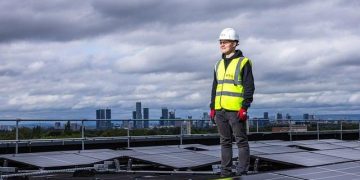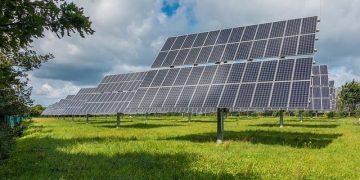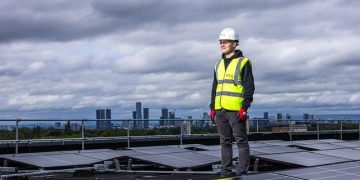In the sprawling tapestry of modern urban landscapes, solar panels glinting under the sun have become a familiar sight. As businesses increasingly turn to commercial solar installations, the question arises: who truly reaps the rewards of this green revolution? Is it a boon solely for the companies seeking to trim their energy costs and bolster their eco-credentials, or do these shimmering arrays extend their benefits beyond corporate walls to the communities they inhabit? In this exploration, we delve into the dual-edged nature of commercial solar projects, examining their impact not just on balance sheets, but on the shared spaces and futures of the neighborhoods they call home. Join us as we unravel the intertwined destinies of commerce and community, where sunlight fuels both enterprise and everyday life.
Community Impact and Economic Growth
Commercial solar installations are more than just an investment for businesses; they have the potential to transform local communities and stimulate economic growth. Job creation is one of the most immediate benefits, as these projects often require skilled labor for installation and ongoing maintenance. This influx of employment opportunities can invigorate local economies, providing stable incomes for families and stimulating local businesses. Furthermore, lower energy costs for businesses can translate into more competitive pricing for their goods and services, benefiting consumers and encouraging economic activity within the community.
Beyond economic metrics, commercial solar projects contribute to environmental sustainability, a growing concern for many communities. By reducing reliance on non-renewable energy sources, these installations can decrease the community’s overall carbon footprint. This shift can improve public health and quality of life, as cleaner air and water result from reduced pollution. Additionally, solar installations often lead to educational opportunities, as local schools and organizations may partner with businesses to provide learning experiences centered around renewable energy. These initiatives not only inform but inspire future generations to engage with sustainable practices.

Environmental Advantages of Solar Energy
Harnessing the sun’s power offers a plethora of ecological benefits that extend beyond just reducing electricity bills. Solar energy significantly cuts down on harmful emissions by replacing fossil fuels, thereby playing a crucial role in combating climate change. The adoption of solar installations reduces the community’s carbon footprint, helping to foster a cleaner and healthier environment. Moreover, the shift towards solar energy promotes biodiversity by lessening the impact on ecosystems compared to traditional energy sources.
- Reduction in air pollution: Solar panels generate electricity without emitting pollutants, which helps improve air quality.
- Conservation of water resources: Unlike coal or natural gas plants, solar installations require minimal water for operation, preserving this vital resource.
- Decreased reliance on non-renewable resources: Solar energy contributes to a more sustainable energy grid by utilizing an inexhaustible source.

Balancing Business Interests with Public Benefits
In the evolving landscape of renewable energy, commercial solar installations have become a focal point of discussion regarding their dual role in benefiting both businesses and communities. At first glance, the primary beneficiaries appear to be the businesses themselves, enjoying reduced energy costs and enhanced sustainability credentials. However, a closer look reveals a broader spectrum of potential advantages that ripple outward into the community.
One of the most notable public benefits includes the reduction of carbon footprints, contributing to cleaner air and a healthier environment. Communities often experience economic boosts as these installations create jobs, from construction to ongoing maintenance. Moreover, the increased energy efficiency and reliability can lead to lower utility costs for surrounding areas. While challenges such as land use and aesthetic impact may arise, the overall communal gains from commercial solar installations can be significant, intertwining business prosperity with public well-being.

Strategic Recommendations for Inclusive Solar Initiatives
To ensure that commercial solar installations offer substantial benefits to both businesses and the wider community, several strategic actions can be undertaken. First, incentivizing local partnerships between businesses and community organizations can help in sharing resources and knowledge. This can lead to the development of solar projects that are tailored to the unique needs of the community.
- Community Ownership Models: Encourage the establishment of cooperative ownership structures that allow local residents to have a stake in the solar installations.
- Education and Training Programs: Develop initiatives that provide education and training in solar technology, thus equipping the local workforce with valuable skills and promoting job creation.
- Affordable Energy Solutions: Ensure that a portion of the energy generated is allocated to low-income households at a reduced rate, thereby making renewable energy more accessible.
By implementing these recommendations, businesses can foster a more inclusive approach that aligns with community development goals, ultimately ensuring that solar initiatives contribute to broader social and economic progress.
In Retrospect
As we stand at the crossroads of energy evolution, the debate over the community versus business benefits of commercial solar installations offers no simple answers. Instead, it opens a dialogue, inviting stakeholders from all walks of life to envision a future where sustainability and profitability harmoniously coexist. The sun, an ancient and boundless source of power, beckons us to rethink our approach to energy consumption and its broader implications. As businesses harness its rays, the challenge lies in ensuring that the warmth of its benefits is felt beyond the confines of boardrooms and balance sheets, reaching into the heart of our communities. Whether these solar ventures become beacons of shared progress or remain symbols of corporate gain will depend on our collective commitment to inclusivity, innovation, and integrity. As we look towards a horizon brightened by possibility, the true measure of success will be how well we illuminate the path for all.


































